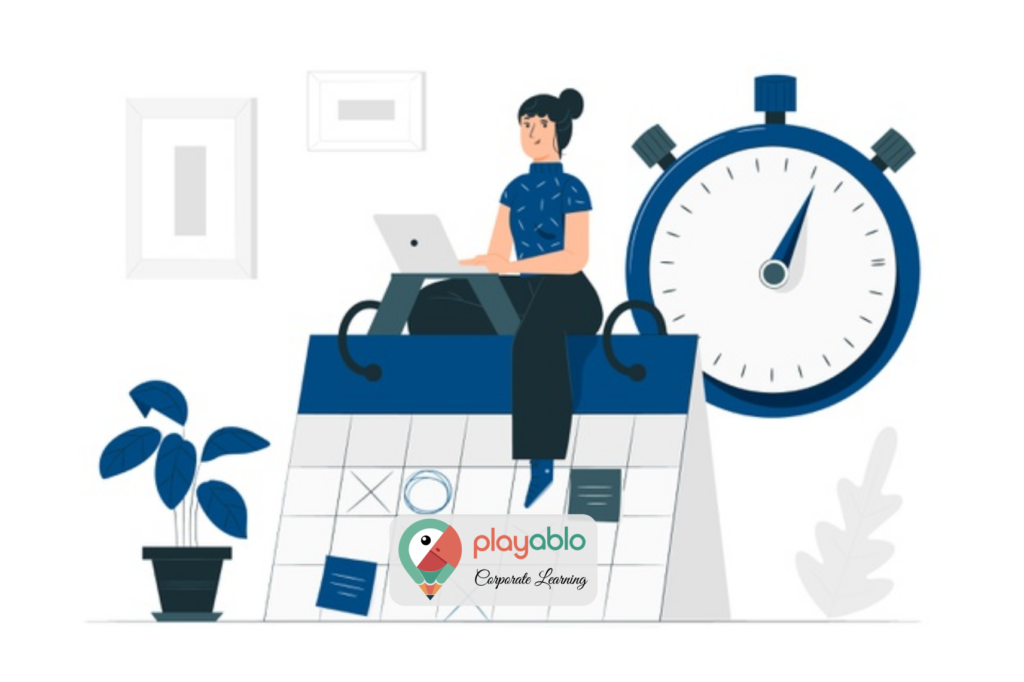What are the challenges in implementing eLearning? Well, Learn, Share, Grow – this is the basic mantra of a comprehensive eLearning platform. Yes, digital learning paves the way for company-wide growth. However, just like any other methodology, online corporate training has its own share of challenges too.
A recent report by Guide2Research gives the following valuable insights:
- 32% of learners find that there are no proper policies and guidelines in effect for the eLearning system.
- Despite having many courses available through mobile devices, 17% of online learners complain that their eLearning program does not support mobile access.
- 27% of learners claim that they do not have the basic skills to make the eLearning system work for them.
Well, we can go on, but you get the gist. Roadblocks like undefined policies, accessibility, and lack of technological know-how hamper the full adoption of e-learning into a standardized corporate learning model. Couple this with additional obstacles like unrealistic deadlines and tight budgets — and the list seems unending!

However, every problem has a solution. And with a little bit of research, accompanied by some tried-and-tested methods, you can implement a successful eLearning program. So, today, let’s outline some of the common challenges in implementing eLearning in your organization. Not to worry! We have their respective solutions as well!
Table of Contents
Bland Content and Lack of Learner Engagement
Dull content and subjects, which lull learners to sleep, are one of the major challenges in implementing eLearning — faced by eLearning developers. For instance, say compliance training — which is essential for every organization but often, considered as a routine that needs to be completed as soon as possible. However, with the application of creativity and some clever resources, even a boring subject like compliance training can be made interesting.

Some of the tools that make eLearning engaging and exciting are social media and gamification elements. While social channels enable learners to interact with their peers and subject-matter experts, gamified quizzes or assessments keep trainees motivated to complete a module. Again, if you encourage learners to create their own content or offer inputs in the final design, it will make them feel more involved. Even the final training module will be more relevant and relatable to the targeted job roles.
Even after implementing the above measures, learners can not be 100% committed to the e-learning experience. The reasons can be a hectic work schedule and lack of time — some of the common
What are the challenges in implementing eLearning? Well, Learn, Share, Grow – this is the basic mantra of a comprehensive eLearning platform. Yes, corporate online learning paves the way for company-wide growth. However, just like any other methodology, online corporate training has its own share of challenges in implementing eLearning too, which cause distractions.
Moreover, the learning behavior of the modern Gen-Y is ruled by the ability to absorb maximum information within short time frames. They also need to access knowledge on the go from any device. So, how do you ensure that? Mobile learning and micro-learning are the answers!
Both of the aforementioned online training methodologies ensure an interactive and immersive e-learning course — which is available at the learners’ fingertips.
Ad: PlayAblo’s Enterprise-Grade Micro-Learning platform is built for the corporate learner. Micro-Learning, along with assessments and gamification features, ensures learning outcome measurement along with sustained engagement.
Find out more and request a custom demo!
Unavailability of the Right Technology

Each year sees the introduction of new technological innovations — tools, gadgets, and software. The tech market features so many options that L&D leaders often get confused about which tools they should invest in — another of the crucial challenges in implementing eLearning. Hence, we highly recommend you stay updated with the latest technology developments to get an idea. How can you do that? By enrolling for tech conferences, eLearning events, and trade shows. You can then easily understand which technologies will suit your requirements.
A Multi-generational Workplace

According to a recent study by Purdue Global, you can roughly segment the multi-generational corporate workforce as follows:
- Traditionalists: 2% (1925-1945)
- Baby Boomers: 25% (1946-1964)
- Generation X: 33% (1965-1980)
- Gen Y AKA Millennials: 35% (1981-2000)
- Generation Z: 5% (2001-2020)
This counts as both merits and demerits of online classes. With five generations of employees working in tandem, you cannot design an eLearning course with the one-size-fits-all concept. This is one of the universal challenges in implementing eLearning. Y
You should kick off the process of creating digital learning software by understanding their different traits and behavioral patterns. For instance, non-Millenials have invented the online world while Millennials grew up in it. So, how do you address their varying preferences in a single training program?
Start by gathering information on your learners’ goals, interests, and backgrounds. Analyze the results and use the data to design employee personas. Now, customize the learning modules based on each generational segment’s experience level and technological prowess. You can also take the help of AI, which provides automated, responsive, adaptive, and personalized training platforms.
Impossible Targets

MBA students will know what we mean by impossible deadlines! Sleepless nights and copious amounts of energy drinks- all for submitting assignments at 11.59 pm! Well, the scene does not get any better in many corporate set-ups. However, unhealthy amounts of stress cannot give efficient results.
This is applicable even in eLearning — one of the challenges in implementing eLearning. Here, the targets need to be realistic. Therefore, before setting deadlines, you must discuss them with your management — so that they are aware of everything involved in the training process. Only then will they offer their support in finalizing targets that provide value and are adequately aligned to business objectives.
Inexperienced Subject Matter Experts

It is a common trend to recruit Subject Matter Experts who have never practically handled e-learning models. To overcome this
What are the challenges in implementing eLearning? Well, Learn, Share, Grow – this is the basic mantra of a comprehensive eLearning platform. Yes, digital learning paves the way for company-wide growth. However, just like any other methodology, online corporate training also has its own share of merits and demerits of online classes.
To overcome such challenges in implementing eLearning, you can help SMEs in enhancing their knowledge by supplying them with the required resources. Apart from the SMEs, involve your employees in creating content as well. Since they are the ones who will be practically applying the absorbed knowledge in their roles, their contributions are valuable. The result? A more targeted and concise eLearning program!
Low e-Learning Budgets

You cannot allocate an unlimited budget for your eLearning platform. Hence, you will need to work around limited financial resources — another of the common challenges in implementing eLearning. So the best way to get started is by creating a comprehensive budget — inclusive of all the bells and whistles. And be realistic while making the estimate. Additionally, in your budget, you can also include the potential Return on Investment, to get faster approval from the management.
Wrapping it Up
Implementing eLearning software does have its fair share of hurdles. But if you have a clear set of objectives, overcoming these challenges in implementing eLearning should not be difficult. Again, if you have to pick a new eLearning authoring tool or Learning Management System, you should first begin by narrowing down your list of must-have features. Shortlist LMS providers who have the option of giving you free trials. After thorough analysis, select an LMS software that best aligns with your organizational goals.
Ad: PlayAblo’s Enterprise-Grade Micro-Learning platform is built for the corporate learner. Micro-Learning, along with assessments and gamification features, ensures learning outcome measurement along with sustained engagement.
Find out more and request a custom demo!







2 Comments
Comments are closed, but trackbacks and pingbacks are open.